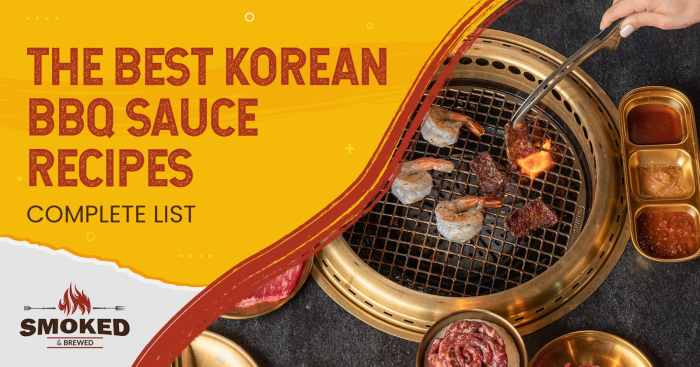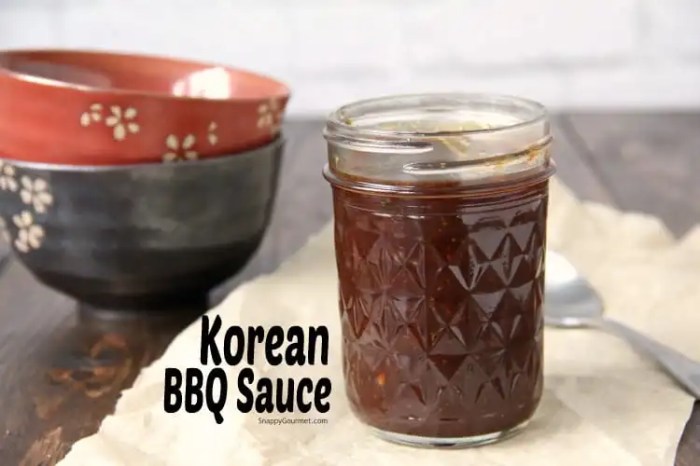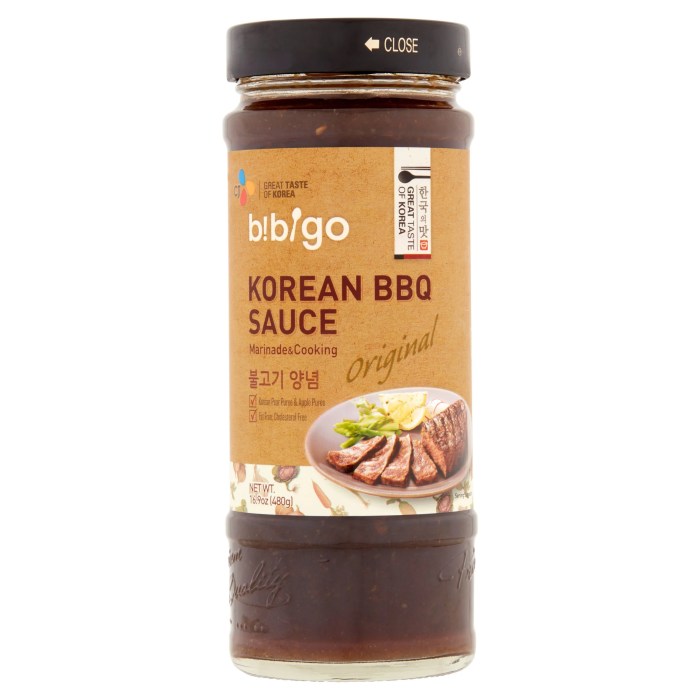Best Korean BBQ Sauce Recipe A Flavorful Guide
Korean BBQ Sauce: A Flavorful Journey: Best Korean Bbq Sauce Recipe
Best korean bbq sauce recipe – Korean BBQ sauce, a vibrant and complex condiment, is far more than just a simple accompaniment to grilled meats. It’s a testament to Korean culinary heritage, a harmonious blend of sweet, savory, spicy, and umami notes that elevates any dish. Its history is intertwined with the evolution of Korean cuisine, reflecting the nation’s rich agricultural traditions and its diverse influences.
Introduction to Korean BBQ Sauce
Korean BBQ sauce boasts a rich history deeply rooted in Korean culinary traditions. Its development is linked to the widespread availability of ingredients like gochujang (Korean chili paste), soy sauce, and various aromatics. The sauce’s characteristic flavor profile is a dynamic interplay of sweet, spicy, savory, and umami elements, creating a complex and unforgettable taste. This balance is achieved through a careful combination of gochujang for its fiery kick, soy sauce for its salty depth, garlic and ginger for their pungent aroma, and sweeteners like sugar or honey for their balancing sweetness.
Common ingredients also include sesame oil for its nutty fragrance and sometimes a touch of fruit juice for added complexity.
Essential Ingredients and Their Variations

Source: smokedandbrewed.com
The foundation of any exceptional Korean BBQ sauce lies in its core ingredients. Each component plays a crucial role in shaping the final flavor profile.
Gochujang, the quintessential Korean chili paste, provides the signature spicy, fermented flavor. Soy sauce contributes a crucial salty element and a desirable viscosity. Garlic and ginger, alongside other aromatics such as scallions or onions, add depth and complexity to the flavor profile. Sweeteners, such as sugar, honey, or corn syrup, balance the spice and saltiness, while sesame oil contributes a rich, nutty aroma and adds a subtle layer of flavor.
Different sweeteners impact the overall sweetness and texture. Sugar offers a straightforward sweetness, while honey adds a more complex floral note. Corn syrup provides a smoother, less crystalline sweetness. The choice depends on personal preference and the desired overall taste.
| Sauce Variation | Gochujang | Soy Sauce | Sweetener | Other Ingredients | Flavor Profile |
|---|---|---|---|---|---|
| Classic Spicy | High | Medium | Sugar | Garlic, Ginger, Sesame Oil | Bold, Spicy, Savory |
| Sweet & Savory | Medium | Medium | Honey | Garlic, Ginger, Sesame Oil, Scallions | Balanced, Sweet, Umami |
| Mild & Fruity | Low | Medium | Sugar, Apple Juice | Garlic, Ginger, Sesame Oil | Subtle, Sweet, Fruity |
| Spicy-Garlic | High | Medium | Sugar | Lots of Garlic, Ginger, Sesame Oil | Fiery, Garlicky, Savory |
Recipe Variations and Cooking Methods

Source: snappygourmet.com
Three distinct recipes demonstrate the versatility of Korean BBQ sauce, showcasing variations in flavor profiles and ingredient combinations.
Classic Spicy Korean BBQ Sauce
- 1/2 cup gochujang
- 1/4 cup soy sauce
- 2 tablespoons sugar
- 2 tablespoons rice vinegar
- 1 tablespoon sesame oil
- 1 tablespoon minced garlic
- 1 tablespoon minced ginger
- 1 teaspoon minced scallions
Combine all ingredients in a saucepan and simmer over low heat for 10-15 minutes, stirring occasionally, until thickened and flavors meld. Adjust sweetness and spice level to taste.
Sweet and Savory Korean BBQ Sauce
- 1/4 cup gochujang
- 1/4 cup soy sauce
- 2 tablespoons honey
- 1 tablespoon rice vinegar
- 1 tablespoon sesame oil
- 1 tablespoon minced garlic
- 1 tablespoon minced ginger
- 1/2 teaspoon grated pear (optional)
Combine all ingredients in a saucepan and simmer over low heat for 10 minutes, stirring frequently. Adjust sweetness and spice level to preference.
Mild and Fruity Korean BBQ Sauce
- 2 tablespoons gochujang
- 1/4 cup soy sauce
- 2 tablespoons brown sugar
- 2 tablespoons apple juice
- 1 tablespoon sesame oil
- 1 tablespoon minced garlic
- 1 teaspoon minced ginger
Combine all ingredients in a saucepan and simmer over low heat for 5-7 minutes, stirring occasionally, until slightly thickened. Adjust sweetness and spice level as needed.
Finding the best Korean BBQ sauce recipe often involves balancing sweet and savory notes. A good starting point might be considering the sweetness profile; for a unique twist, you could even incorporate elements from a fantastic apple sauce recipe for canning , perhaps using a slightly reduced version for a deeper flavor. This unexpected addition could provide a subtle sweetness that complements the traditional Korean BBQ flavors beautifully, resulting in a truly memorable sauce.
Serving Suggestions and Pairings

Source: walmartimages.com
Korean BBQ sauce is incredibly versatile. It enhances the flavor of a wide variety of meats and vegetables. It can be used as a marinade before grilling, adding both flavor and color, or as a dipping sauce after grilling to provide a rich, flavorful coating.
| Sauce Variation | Meat Pairings | Vegetable Pairings |
|---|---|---|
| Classic Spicy | Beef Bulgogi, Pork Belly | Mushrooms, Peppers, Onions |
| Sweet & Savory | Chicken, Shrimp | Asparagus, Zucchini, Eggplant |
| Mild & Fruity | Salmon, Tofu | Broccoli, Carrots |
Grilled meats glazed with Korean BBQ sauce typically exhibit a glossy, rich sheen. The color varies depending on the sauce used, ranging from a deep reddish-brown in spicier versions to a more amber hue in sweeter variations. The texture is enhanced by the sauce, becoming slightly sticky and caramelized.
Storage and Shelf Life, Best korean bbq sauce recipe
Proper storage is essential to maintain the quality and flavor of homemade Korean BBQ sauce. Refrigerate leftover sauce in an airtight container for up to a week. For longer storage, freeze the sauce in airtight containers or ice cube trays for up to three months. To extend shelf life, consider adding a small amount of vinegar or lemon juice to the sauce before storing.
General Inquiries
Can I make this sauce ahead of time?
Yes! Homemade Korean BBQ sauce stores well in the refrigerator for up to a week or can be frozen for longer storage.
What if I don’t have gochujang?
While gochujang is key, you can substitute with a blend of chili paste and a touch of brown sugar for a similar flavor profile, though it won’t be exactly the same.
Can I use this sauce on other meats besides beef?
Absolutely! This sauce is delicious on chicken, pork, tofu, and even vegetables.
How do I adjust the thickness of the sauce?
Simmer the sauce for a longer period to thicken it, or add a cornstarch slurry for a quicker method.




















